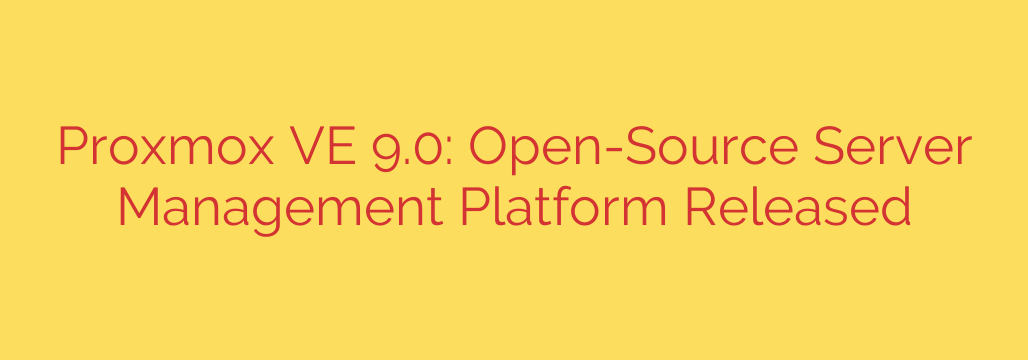
Exploring Proxmox VE 9.0: A Major Upgrade for Your Virtualization Platform
The latest major version of the popular open-source server virtualization platform, Proxmox Virtual Environment, has been released, bringing a host of significant upgrades and new features. Proxmox VE 9.0 is a landmark update, built on a fresh foundation and packed with enhancements that improve performance, security, and management efficiency for system administrators and DevOps professionals.
This release marks a substantial leap forward, moving beyond incremental changes to deliver a truly modernized virtualization experience. Let’s dive into what makes Proxmox VE 9.0 a compelling upgrade for your infrastructure.
A Modern Foundation: Debian 12 and Linux Kernel 6.8
At the core of Proxmox VE 9.0 is its new base: Debian 12, codenamed “Bookworm.” This upgrade provides a stable and up-to-date operating system foundation, ensuring access to the latest security patches and software packages for years to come.
Paired with this is the inclusion of a much newer Linux Kernel 6.8. This is a critical enhancement that brings:
- Improved Hardware Support: Better compatibility with the latest-generation CPUs, storage controllers, and network interface cards (NICs).
- Enhanced Performance: Kernel-level optimizations can lead to better overall system performance and efficiency for both virtual machines and containers.
- Latest Drivers: Access to updated drivers for a wider range of hardware, reducing compatibility issues during installation and operation.
Upgraded Core Technologies for Virtualization
Proxmox VE 9.0 updates all the essential components that power its virtualization and storage capabilities. Users will benefit from the latest versions of key technologies, including:
- QEMU 8.1.5: The powerhouse behind KVM virtualization gets a major update, offering new features, bug fixes, and performance improvements for your VMs.
- LXC 6.0: The tools for managing Linux Containers have been upgraded, providing better container management and security.
- ZFS 2.2.3: The robust, open-source file system and volume manager receives an update that enhances its stability and performance, which is crucial for reliable data storage.
Key New Features to Streamline Management
Beyond the foundational upgrades, Proxmox VE 9.0 introduces several powerful new features designed to simplify administration and bolster security.
Enhanced Security with Stricter Access Controls
Security is a top priority in this release. A significant new feature is the ability to enforce two-factor authentication (TFA/2FA) through Access Control Lists (ACLs). Previously, TFA was a user-level choice. Now, administrators can create specific roles or grant permissions that explicitly require 2FA to be active. This is a critical step for securing administrative accounts and meeting compliance requirements.
Security Tip: We highly recommend creating an “admin-with-tfa” role and assigning it to all users with high-level privileges. This ensures that your most critical access points are protected by an additional layer of security.
Automated and Unattended Installations
For those managing large-scale deployments or building automated infrastructure, Proxmox VE 9.0 introduces a game-changing feature: fully automated, unattended installations. By creating a custom configuration file, you can now automate the entire setup process, from partitioning and network configuration to licensing. This dramatically reduces manual effort and ensures consistent, error-free deployments across multiple servers.
Improved Network Resilience
Network stability is vital for any virtualization host. This release brings a welcome improvement to network bridge and bond management. Now, network configurations for bridges and bonds remain active even if an underlying physical port is temporarily down or disconnected. This prevents the entire virtual network from failing due to a single cable pull or NIC issue, significantly increasing uptime and service reliability.
Ceph Storage Integration Updates
For users leveraging Proxmox VE for hyperconverged infrastructure (HCI), the integrated Ceph support has been updated. New clusters will now default to Ceph Reef (18.2.0), bringing the latest performance and stability improvements to your distributed storage backend. Existing clusters can be easily upgraded, and the management tools within the Proxmox GUI have been refined to better handle Ceph operations.
Is It Time to Upgrade?
Proxmox VE 9.0 is more than just an incremental update; it’s a major evolution of the platform. The shift to Debian 12 and a modern kernel, combined with powerful new features for security, automation, and networking, makes it a highly attractive release.
An upgrade path from Proxmox VE 8.1 is available and well-documented. As always, before upgrading a production environment, it is crucial to read the official release notes carefully and perform thorough testing in a non-critical or lab environment. By doing so, you can ensure a smooth transition and begin taking advantage of the powerful new capabilities offered in this impressive new version.
Source: https://www.helpnetsecurity.com/2025/08/06/open-source-server-management-platform-proxmox-ve-9-0-released/








